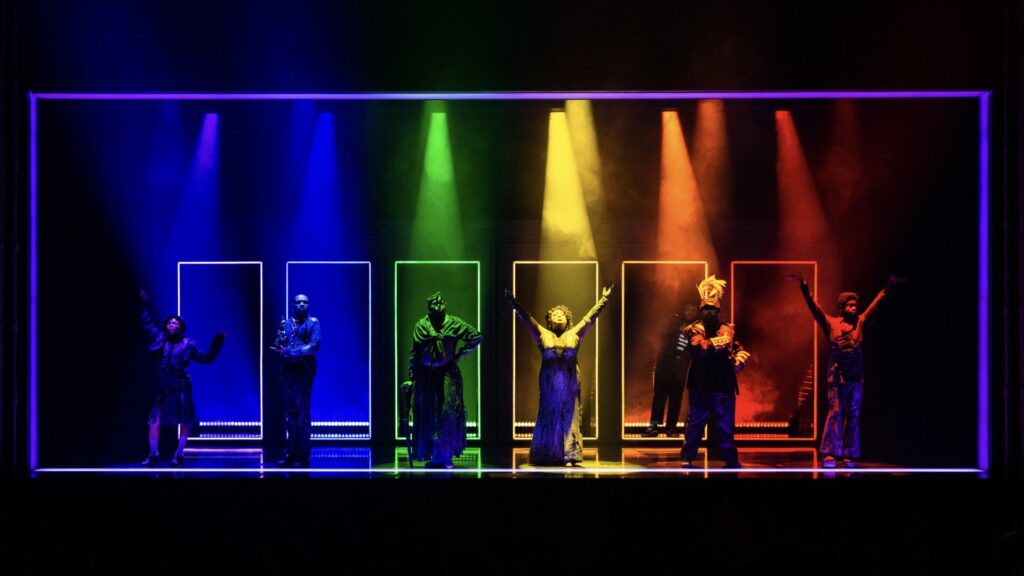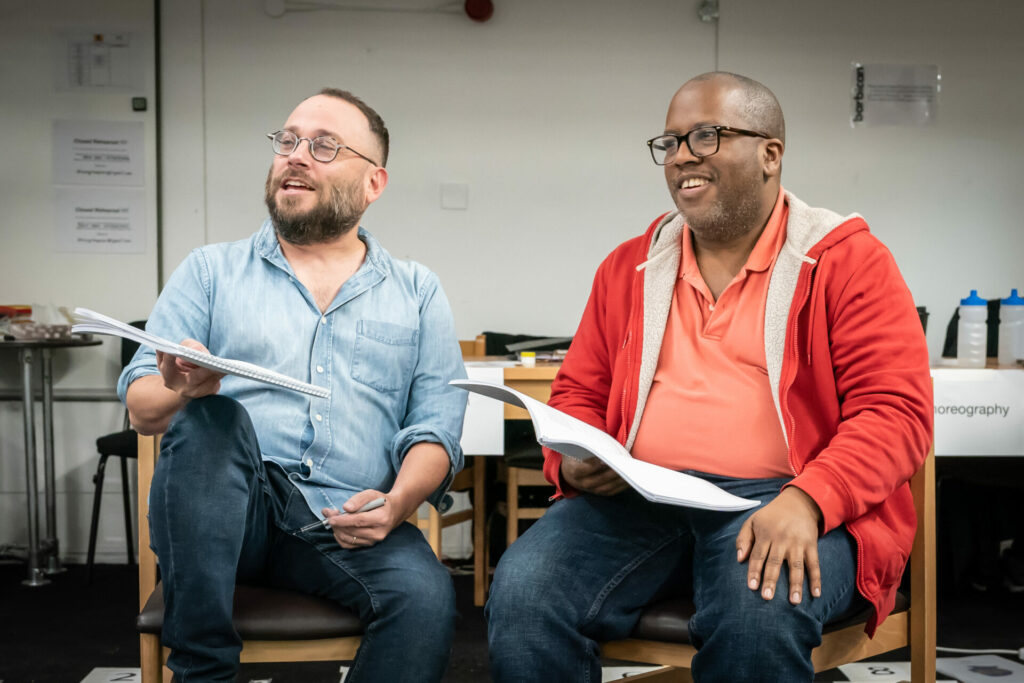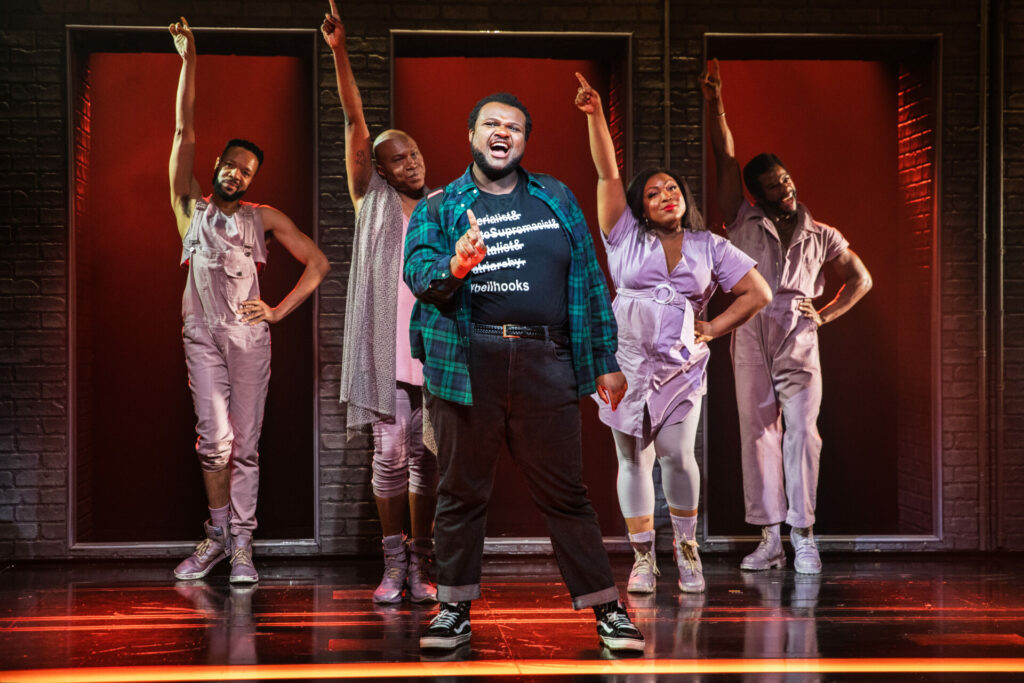Michael R Jackson on A Strange Loop, queer Black identity, and transformative power
"The piece, in turn, began to sort of morph into a broader exploration of self."
By James Hodge

The A Strange Loop preview at the RVT is unlike other previews I have attended. It’s the first live performance of a selection of numbers from the new musical transferring from Broadway that will grace the stage of the Barbican for twelve weeks this summer. But where usually a preview is just that – a taster of what is to come – it’s evident that this audience are already a dedicated fanbase, thrilled to see one of their favourite soundtracks live. As the cast takes to the stage, the applause reaches a crescendo, only to be topped by a performance of three numbers that are at once high-energy, hysterical, soulful and joyous.
First launching off-Broadway in 2019, the musical has gone from success to success, later transferring to Washington DC and finally, Broadway itself. It has since won two Tony awards and writer Michael R Jackson has been awarded the greatest accolade for writers – the Pulitzer. When I speak to him the following day, he reveals it’s been a long road to get to this point.
“Sixteen years in the making!” Michael tells me. “I began it when I was 22 years old. It started life as a monologue – Why Can’t I Get Work? It was meant to be a thinly veiled personal monologue chronicling what it felt like in real time to be a young black gay man walking around New York wondering why life was so terrible.” However, it was his infusion of his love of musicals that brought the story to life. “I began to write my own music and the songs started to speak to the monologue. The piece, in turn, began to sort of morph into a broader exploration of self.”
“Sixteen years in the making!”
The autobiographical nature of A Strange Loop is undeniable. It tells its story through metanarrative – Usher, an overweight queer black man, is writing a musical about an overweight queer black man who is writing a musical about… (You get the picture.) Surrounded by an ensemble of performers playing his thoughts, the premise was inspired by the eponymous cognitive science theory explored by Douglas Hofstadter, who explored the nature of self reference and consciousness of the self – how we create our own ‘I’. However, writing the musical has become a strange loop of its own.
“When I learned about the concept, it was clear that the identity that I was exploring was reflective of this philosophical concept. Usher is constantly in dialogue with his own thoughts which surround him on stage played by six actors. As an intersectional identity, each of his thoughts influence him in different ways. And they are constantly morphing and changing: one minute they are the voices of his parents, the next they are the habitual thoughts of daily self-loathing, and then they are his agents setting him free. They are all of the contesting facets that make up who Usher is as both a person and an artist.” Over the sixteen-year period of writing, Usher has evolved alongside Jackson. “When I change, A Strange Loop changes. And when A Strange Loop changes, I change. That there is a strange loop in itself. As I dig deeper into Usher’s psyche, his experience and self-perception changes, and so does mine. As I learned more about him, he learned more, but equally, I learned more about myself.”

If the musical sounds cerebral in its premise, the delivery is far from it. Whilst it explores the many challenges that face Usher – familial rejection; sexual racism; body consciousness – the execution is playful, witty and joyous. The songs are brilliantly written – titles such as ‘Inner White Girl’, ‘Inwood Daddy’ and ‘Exile In Gayville’ effervesce and fizz with fun and thoughtfulness. But it’s Usher that audiences have fallen in love with. He was one of the many draws of the production for now-producer, Alan Cumming.
“On the one hand, Michael has written a hugely personal story, and in Usher, we have a vehicle to explore big political ideas. But regardless of his own specific experiences, you feel a real empathy with what he’s going through. He’s similar to all of us – an everyman. We all have those little voices talking to us in our heads – simultaneously building us up, breaking us down, holding us back and pushing us forward. It’s a stunning role in a production, unlike anything I have seen before.”

These ups and downs are reflective of Jackson’s own personal philosophy. “It was important to me in developing the show that Usher is sort of relentlessly in pursuit of real life. That’s what he’s trying to capture. Real life is sometimes joyful and sometimes it’s a bummer – it swings back and forth.” So what is it that gets Usher through? “It’s his dark sense of humour. In life, through good times or bad, you have to be able to laugh at yourself. And I think that that’s one thing Usher does maybe a little too well. But it’s also the key to what frees him. We have to be able to find the humour every day, or else we essentially live in captivity.”
“The politics of it is a strange loop of its own, but I’m not offering any specific mandate.”
It feels inherently political when a production gives voice to marginalized identities, but to Jackson, the production is far from political. “I guess the question is, is the personal political? I could say that if you look at Usher’s experience as a microcosm experience for many, perhaps. But from the inside, it doesn’t feel political to me because I’m the one artist that made it. I’m only speaking for myself. But there are people who will say, oh, this is my story. And it is their story, but it’s also my story. There’s a slipperiness to it. The politics of it is a strange loop of its own, but I’m not offering any specific mandate.”

At the same time, Cumming has found watching the show transformative. “It’s so powerful in its expression of what it’s like to be overweight, queer and black. I was so impressed and surprised but equally educated. The show manages to be a clever and hilarious piece of entertainment, but it’s discussing things we all need to talk about more.’ He hopes that the show will reach the broad audience it deserves. “Sometimes, people see a play about the black voice, and imagine that it will be unrelatable – a black show about black people and black issues, I think that means that sometimes white people think, oh, that’s not for me. But actually, I think it’s really important that more white people, especially queer white people, go and see this and try to understand and empathise with what it’s trying to say about that experience. I saw the show by accident, and it completely horrifies me to imagine that I might have gone through life not seeing it. It’s not just a brilliant story, but it’s one that has made me think and feel deeply.”
The first live performance is a definitive hit, and the crowd is rapturous at the end of the show. The only people effervescing more joy is the cast. Jackson is incredibly proud of the creative team behind the show. “I am nothing without my collaborators. The performers are incredible – one ensemble, coming together to explore one character’s self-enquiry and analysis, allowing us to explore him from all different angles.” He’s keen to sing the praises of others too – “Director Steven Brackett; choreographer Raja Feather Kelly; music supervisor Rona Siddiqui. I can’t tell the story without them.” Jackson’s final reflection leads us to yet another strange loop – the fact that so many talented people have brought one man’s vision to the stage and given it a life of its own. A strange loop indeed.
A Strange Loop is running at the Barbican Theatre, for tickets visit strangeloopmusical.com
